Golden, Golden… Gone! A look at two little-known compilations from the once-mighty label where major cartoon, TV and film stars spun grooves into gold.
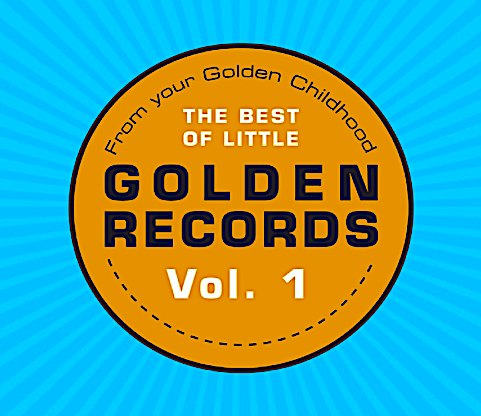
Your Golden Childhood
THE BEST OF LITTLE GOLDEN RECORDS VOL. 1
MicroWerks (Shout! Factory) WWK-021 (Compact Disc)
Released in 2009. Golden Records Producer: Arthur Shimkin. Shout! Factory Producers: David McLees, Brian Schuman. Creative Consultant / Liner Notes: Greg Ehrbar. Project Assistance: Bill Smith, Robert Kim. Musical Direction: Mitch Miller, Jimmy Carroll, Jim Timmens, Arthur Norman. Remastering: Jerry Peterson. Package Design: Etc. Studios. Special Thanks: Carl Shimkin. Running Time: 32 minutes.
Performers: Jack Mercer, Jimmy Durante, Art Carney, Shari Lewis (with Lamb Chop, Hush Puppy and Charlie Horse), Roy Rogers, Dale Evans, Mel Allen, Betty Clooney, Anne Lloyd, Gil Mack, Mike Stewart, The Sandpiper Singers, The Rita Williams Singers.
Songs: “I’m Popeye the Sailor Man” by Sammy Lerner; “Fuzzy Wuzzy” by Al Hoffman, Milton Drake and Jerry Livingston; “You’re a Grand Old Flag” by George M. Cohan; “Yankee Doodle Bunny (The Holiday Bunny)” by Cliff Friend; “Scuffy the Tugboat” by Alec Wilder, Mitchell Barer; “Oklahoma!” by Richard Rodgers, Oscar Hammerstein II; “Open Up Your Heart (And Let The Sun Shine In)” by Stuart Hamblin; “Let a Smile Be Your Umbrella” by Sammy Fain, Irving Kahal, Francis Wheeler; “The Ugly Duckling” (from Hans Christian Andersen) by Frank Loesser; “On Top of Spaghetti” by Tom Glazer; “The Farmer in the Dell,” “London Bridge,” “Three Blind Mice” (Traditional).
Spoken Word: “Casey at the Bat” adapted from the Verse by Ernest Lawrence Thayer, by Marshall Barer. Your Golden Childhood
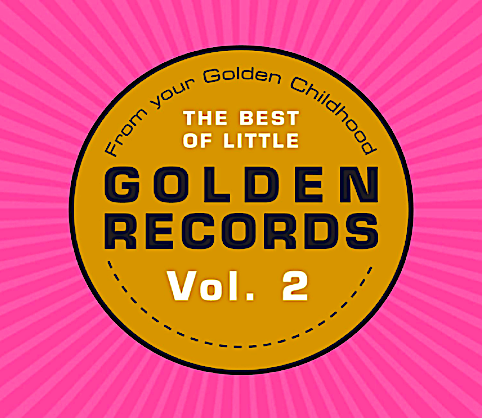
THE BEST OF LITTLE GOLDEN RECORDS VOL. 2
MicroWerks (Shout! Factory) WWK-022 (Compact Disc)
Released in 2009. Golden Records Producer: Arthur Shimkin. Shout! Factory Producers: David McLees, Brian Schuman. Creative Consultant / Liner Notes: Greg Ehrbar. Project Assistance: Bill Smith, Robert Kim. Musical Direction: Mitch Miller, Jimmy Carroll, Jim Timmens, Arthur Norman. Remastering: Jerry Peterson. Package Design: Etc. Studios. Special Thanks: Carl Shimkin. Running Time: 30 minutes.
Performers: Roy Halee, Cliff Edwards, Shari Lewis (with Lamb Chop, Hush Puppy and Charlie Horse), Jimmy Durante, Roy Rogers, Dale Evans, Bert Parks, Paul Tripp, Mike Stewart, Anne Lloyd, Phil Rizzuto, Tommy Heinrich, Ralph Branco, Roy Campanella, The Sandpiper Singers, The Golden Singers.
Songs: “Mighty Mouse Theme,” by Philip Scheib, Marshall Barer; “Give a Little Whistle” (from Pinocchio) by Ned Washington, Leigh Harline; “Peter Cottontail” (Year Round Version) by Steve Nelson, Jack Rollins; “Yankee Doodle Dandy” by George M. Cohan; “I Like People (The Friendly Song)” by Mitchell Barer, Margaret Wise Brown, Ruth Cleary; “Take Me Out to the Ballgame” by Jack Northworth, Albert Von Tilzer; “The Little Engine That Could” by Milton Pascal, Gerald Marks; “The Carousel Waltz” (from Carousel) by Richard Rodgers; “Song Wagon” by Dean Fuller, Marshall Barer; “Tubby the Tuba” by Paul Tripp, George Kleinsinger; “Hi-Lili, Hi-Lo” (from Lili) by Bronislau Kaper; “The Ballad of the Alamo” (from The Alamo) by Dimitri Tiomkin, Paul Webster; “Puff, the Magic Dragon” by Peter Yarrow, Leonard Lipton; “Clementine” (Traditional)
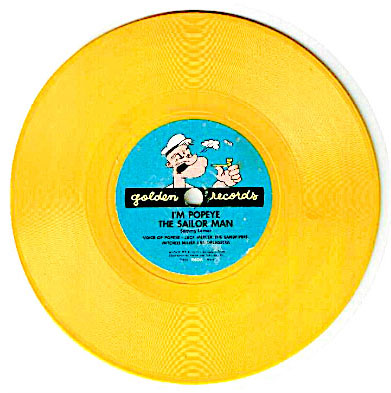
Little Golden Records were introduced in 1948 as companion products to the wildly successful Little Golden Books. Unlike the books, which are still abundant today, Golden Records have all but disappeared from mainstream public consciousness and are not available in their former abundance.
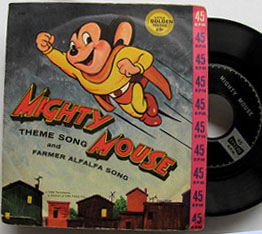 Of course, many of might be considered are dated,as are other (but not all) children’s records of the baby boomer era. Captain Kangaroo, Howdy Doody, Rootie Kazootie and Ding Dong School are Smithsonian artifacts now, as time inevitably marches on. Stars like Art Carney, Bert Parks, Paul Tripp and Gail Davis are not big names in households unfamiliar with The Honeymooners, the early Miss America pageants, Mr. I. Magination and Annie Oakley. Even mentioning the Mickey Mouse Club only suggests celebrities like Ryan Gosling to less-enlightened young audiences.
Of course, many of might be considered are dated,as are other (but not all) children’s records of the baby boomer era. Captain Kangaroo, Howdy Doody, Rootie Kazootie and Ding Dong School are Smithsonian artifacts now, as time inevitably marches on. Stars like Art Carney, Bert Parks, Paul Tripp and Gail Davis are not big names in households unfamiliar with The Honeymooners, the early Miss America pageants, Mr. I. Magination and Annie Oakley. Even mentioning the Mickey Mouse Club only suggests celebrities like Ryan Gosling to less-enlightened young audiences.
But Golden Records were also a place where listeners could hear music and stories from cartoons, films and many Disney titles, in addition to classic and popular children’s tunes. Sometimes they were performed by original casts, more often there were “studio” voices recorded at lower budgets, but nonetheless there were relatively few instances of uninspired efforts, even when the Golden pockets were at their emptiest and as the teen and bubblegum pop all but sent “kiddie” records to the dark reaches of the retail stores.
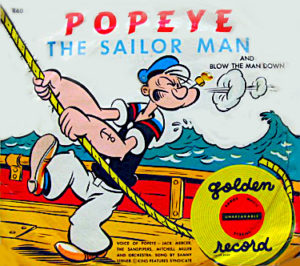 There were other reasons Golden Records began losing their shine. Arthur Shimkin left for Columbia—founding another major children’s line in what became Sesame Street Records. In his place, a succession of fine producers, like Ralph Stein, Howard Scott and finally Dennis Scott did what they could to release exceptional records in an increasingly complex marketplace. That they could hold on so long is, in itself, remarkable. Gradually the label’s name transitioned to “Wonderland,” as the license to “Golden” reverted to Western Publishing. Budgets prevented the label from using the name “Disney” on any products, nor character likenesses, which is why a few of the very last cartoon reissues (like Popeye) were issued with generic covers.
There were other reasons Golden Records began losing their shine. Arthur Shimkin left for Columbia—founding another major children’s line in what became Sesame Street Records. In his place, a succession of fine producers, like Ralph Stein, Howard Scott and finally Dennis Scott did what they could to release exceptional records in an increasingly complex marketplace. That they could hold on so long is, in itself, remarkable. Gradually the label’s name transitioned to “Wonderland,” as the license to “Golden” reverted to Western Publishing. Budgets prevented the label from using the name “Disney” on any products, nor character likenesses, which is why a few of the very last cartoon reissues (like Popeye) were issued with generic covers.
It was all still hanging by a Golden thread, not because of creative teams, but due to legal entanglements behind the scenes that your befuddled author has yet to fully comprehend. The entire enterprise folded in the ‘80s. The recordings floated in limbo for about a decade as various media companies did whatever they could to disentangle things and get some of the recordings back on the market.
The first company to do so was Drive Entertainment, releasing over two dozen albums with only partial access to background materials. They brought me aboard to identify (and sometimes re-identify) Golden and Columbia tracks, artists and create at least one compilation to go with an adaptation of “Madeline’s Rescue” from a Columbia recording. These are some of the restored titles:

The next reissues were released by Image Entertainment and Liberty International without my input because they were unaware I existed. They did, however, pick up my liner notes without giving credit (now, was that nice?) The Image/Liberty packaging explained little or nothing about the contents of each album. The art was pleasant but nondescript. All the previous design was gone. The upside was that, if one could figure out that these were indeed Golden Records, it was nice to have even more titles on CD (including some superhero records that are hard to find on vinyl):
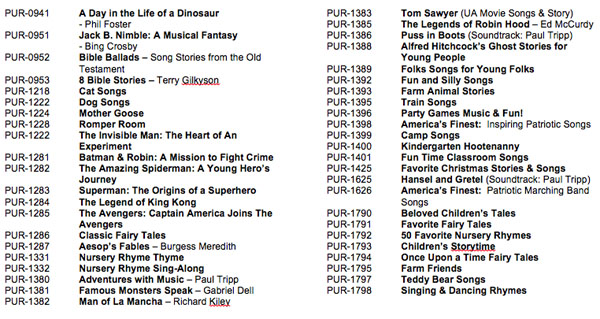
Shout! Factory made the most extensive efforts to comb the frizzies out of what was still tangled in the curls of Golden’s legal tresses. We had also enjoyed a long association, so I was delighted to work on a fresh new line of reissues, all featuring original album art. Also fortuitous was meeting the wonderful Bill Smith, who is just as knowledgeable about Golden Records as I, perhaps more so, since he has firsthand contact with Arthur Shimkin and his family. Bill helped provide materials and information that made the recordings and the support materials better than ever. The following reissues appeared on Shout!’s MicroWerks label:

Somewhere along the way, one super low-budget company released inferior discs of a few titles, including Babes in Toyland with different art, also generic. But most recently, a firm called Verse Music tried the novel technique of adding contemporary celebrity tracks to classic Golden music beds in their “Golden Celebrity Series” and also providing fans with original versions in the “Timeless Series.”

Only two of these CDs were complete compilations of ’50s and ’60s music. Assembly of these two volumes entitled “Your Golden Childhood: The Best of Little Golden Records” began shortly before Shout! assigned me to the project, but I was still welcomed to make a few contributions here and there. Chiefly among them was to ask that the two most historically significant tracks, Popeye and Mighty Mouse, be the first tracks in each collection, instead of putting the tracks in the chronological order as originally planned.
They were kind enough to agree, and to also include such Golden greats as Shari Lewis’ lovely rendition of “Hi-Lili, Hi-Lo”; Jimmy Carroll’s unique arrangement “Carousel Waltz”; a lesser-known Cliff Edwards performance of “Give a Little Whistle”; and “On Top of Spaghetti” recorded by The Rita Williams Singers in London, arranged and conducted by Vic Flick, who played the original lead guitar in the James Bond theme.
“I’m Popeye the Sailor Man” – Jack Mercer and The SandpipersThe Golden version of “I’m Popeye the Sailor Man” made such an impression that it obviously influenced the way Robin Williams performed it in the 1980 film. Not only are the arrangements identical, Jack Mercer himself can be heard near the end (though there seems to be no credit anywhere in the film or on the soundtrack album):
“Mighty Mouse Theme” – Roy Halee and The Sandpipers
This is the very record that Andy Kaufman used to play in his stand-up routine. (In the 1999 Jim Carrey film Man on the Moon, Drive Entertainment is credited for the license to the song.) According to larryandmarshall.com (a site about lyricists Lorenz Hart and Marshall Barer), “Marshall was not too proud of this song but it was a huge hit and helped him economically for a long, long time. Marshall claimed that he wrote the lyrics on a taxi cab on the way to the recording session, like Lorenz Hart, Marshall could write songs in a very short time and in very strange situations.”
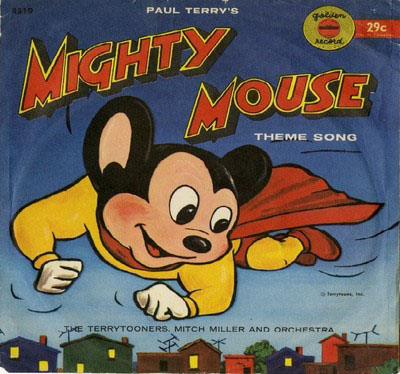


 GREG EHRBAR is a freelance writer/producer for television, advertising, books, theme parks and stage. Greg has worked on content for such studios as Disney, Warner and Universal, with some of Hollywood’s biggest stars. His numerous books include Mouse Tracks: The Story of Walt Disney Records (with Tim Hollis). Visit
GREG EHRBAR is a freelance writer/producer for television, advertising, books, theme parks and stage. Greg has worked on content for such studios as Disney, Warner and Universal, with some of Hollywood’s biggest stars. His numerous books include Mouse Tracks: The Story of Walt Disney Records (with Tim Hollis). Visit 

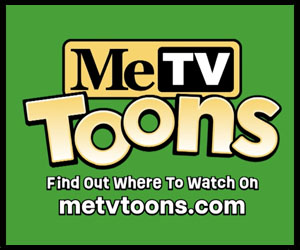







































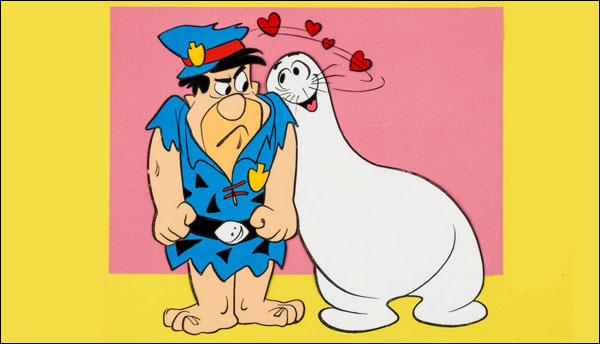
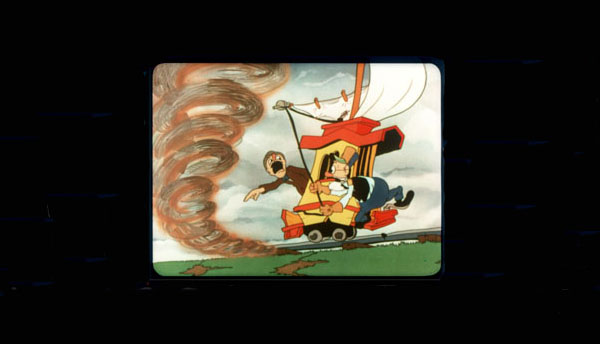










THis post is delish!!! I have them ALLLLLL (still!!)
I had the Shari Lewis recording of “Hi-Lili Hi-lo” when I was a kid. I also had the Little Golden Record “Scarlet Ribbons” b/w “Billy Boy” by a forgotten artist. If I recall, the records were smaller than 45 rpm singles, and played at 78 rpm.
I still have my copy from my childhood.. and I also went and bought a back up copy from ebay a couple years ago.. one of my favorite records as a child..hi lili hi lo
Roy Halee?!?! Is he the father of the Roy Halee who produces all of Paul Simon’s work (including “Graceland”) and most of Simon & Garfunkel’s (including the “Bridge Over Troubled Water” album)? I can’t imagine that it’s the SAME Roy Halee.
It’s the same guy.
https://en.wikipedia.org/wiki/Roy_Halee
The other side (as kids we knew nothing of A- and B-sides) of “Hi-Lili Hi-lo” was “Swinging on a Star” – rediscovered through the magic of the internet.
I had the “Popeye the Sailor Man” Golden Record, with “Blow the Man Down” on the B side, when I was a kid. That was the definitive version for me… always loved Jack Mercer’s scat-singing.
@Andy: Yes, Roy Halee was the father of Simon & Garfunkel’s producer.
Does anyone have or remember what I think was a Golden Record of a song that began: “Here’s to a pip of a pop, the best dad a kid ever had, an all round fellow, fine and mellow, is my dear dad. . .
Paul Tripp wasn’t the only kids tv performer to narrate:”Tubby The Tuba”on disc..singing bandleader/songwriter/puppeteer and Chicago,Ill./NYC kids tv host/performer:Chubby Jackson,”Wonderama”mc:Sonny Fox and Cleveland,Ohio and NYC based kids tv mc:Johnny Andrews also narrated the tale of the tuba..who wanted to perform his own melody on ABC/Paramount,”Simon Says” and “Peter Pan”Records.
As I listen to the golden and wonder land records that came out in the 70s when I was born, I can’t help but wonder if some of the same artists, three of them anyway, can also be heard on the RCA special products title children’s favorites: featuring the jingle Heimer‘s. Three of the voices on that record, the two men and one woman singing, our featured on some golden and wonderland albums in the 70s.
I answered my own question. Partially anyway. Turns out that one of the gentleman that was on one of the golden in Wonderland records in the 70s as well as on RCA records Children’s Favorites featuring the jingle Heimer‘s, was Steve Clayton. Wonder land records, we’re actually owned by Riverside until they were purchased by a company, called AA Records in 1967 or 68. In fact, something tells me that Arthur Shinki
I am looking for a song that had the lyrics “It’s Booboo and Yogi, Booboo and Yogi Bear. What wonderful pair, Booboo and Yogi Bear.” Not sure if it was on an album or a Golden 78. Any help is greatly appreciated.
Growing up (in the 50s) I had tons of Little Golden Records. I still have some, but they are in poor shape. I have the Roy Rogers CD that Drive released, but it doesn’t include a lot of the material they released on LGR. There were also numerous records by Howdy Doody, Rootie Kazootie, The Three Stooges, Disney charachters, etc. that have never been re-released. The 78s were all pressed on yellow Styrine. When they swtched over to 45s, they were also yellow, but then switched over to black. I know there is a book about LGR being released. I can’t wait to read it.
In addition to the artists mentioned above, I also remember artists like Steve Clayton. But his real name was, “Pasquale Tedesco. “Steve Clayton was his stage name, as Pasquale Tedesco might’ve been hard for some people to pronounce, let alone, spell out. The only reason why I’m able to say that, is because I happen to be Italian and Sicilian.and I also remember other artists just like Joan Wile.
Many of you might recall a record label, called Riverside records, that which was started by Bill Grauer and Oran Keepnews that which was sometime in the 1950s, but after Bill’s death, it was sold to a company, that which also simultaneously purchased golden records from Shamkin. The company was just known as, A.A. Records Inc.. And that’s when producers just like Ralph Stein, Dennis Scott and Howard Scott were brought on, as they produced all albums recorded out of New York and New Jersey at least I thought those were places were records were recorded and Vic Flick Was producing records for them out of England involving any albums with the Rita Williams singers. I would note and report that with some of the records with Steve Clayton, half of the time, he was singing with Joan Wile and another gentleman, both of whose voices are heard on a similar record, though not a golden record or a Wonderland record was titled children’s favorites, featuring the jingle Heimer. There was another gentleman as well but I don’t recall his name, as it never came to mind.but on the other half of the golden and Wonderland records featuring Steve Clayton’s voice, he was singing with another lady by the name of Connie Zimet, along with yet another gentleman sometimes doing some of the same songs on the children’s favorites featuring the jingle Heimer album songs like Cindy.
The other thing I want to point out, is not only was Wonderland a spinoff of golden records, both were a division of A.A. Records Inc., Merry children’s records was another record label under the A.A. Umbrella. Remember Arthur Shamkin went on to work for CTW, that used to stand for children’s television workshop to help them form the Sesame Street record label that was an imprint from the mid 70s to the mid 80s. But before he sold the golden records imprint to AA records, the two other artists I would like tomention that who worked under Arthur Shimkin were Edgar Powell and Kathrine )Kay( Lande. And that they both went to continue to perform under AA records when golden was sold to them. Now when Shimkin went to CTW, his partner, music conductor and record producer Jim Timmons went with him. Another interesting fact, is in the early 1980s, Sesame Street records had an album called Sesame country, that which featured songs produced and written by a duo of Paul Barnes and Dennis Scott. So turns out, Dennis Scott of a A records was also involved with the Sesame Street project, but in later years. What a small world that this is! Because I am blind, I am using speech to text. So if I misspelled anything by accident, I do apologize in advance. a lot of what was on the golden records 45 RPMs and 78 RPMs, eventually ended up on the 12 inch 33 and third LPs, that which is how I was able to get my hands on them back in the 1970s, although
I do have some golden 78 as well, one of my uncles gave to me back in the 70s as he was born in 1962 or 1963. Thank you for allowing me to to add and contribute to this conversation, as it always brings back memories.